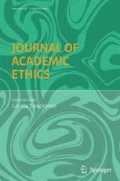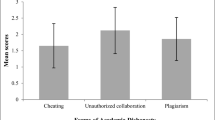Abstract
Academic dishonesty has been a frequent topic of research and discussion. In this article, we examine the differences between student volunteers and student non-volunteers in terms of their attitudes towards academic dishonesty as well as their cheating behaviors. We found that student volunteers held more serious attitudes towards cheating and academic dishonesty than did student non-volunteers; however there were not many significant differences between student volunteers and student non-volunteers when it came to cheating behaviors. We finally provide some suggestions for future research in the topic of academic dishonesty.
Similar content being viewed by others
References
Andrews, M. (2003). Deconstructing volunteerism: The difference between variables predicting student placements and volunteerism activities. M.A. dissertation, Laurentian University of Sudbury (Canada), Canada. Retrieved September 5, 2010, from Dissertations and Theses: The Humanities and Social Sciences Collection. (Publication No. AAT MQ85623)
Arlow, P., & Ulrich, T. (1985). Business ethics and business school graduates: a longitudinal study. Akron Business and Economic Review, 16, 13–17.
Barnett, D. C., & Dalton, J. C. (1981). Why college students cheat. Journal of College Student Personnel, 22, 515–522.
Becker, G. (1968). Crime and punishment: an economic approach. Journal of Political Economy, 76(2), 168–217.
Boz, I., & Palaz, S. (2007). Factors influencing the motivation of Turkey’s community volunteers. Nonprofit and Voluntary Sector Quarterly, 36(4), 643–661. doi:10.1177/0899764006298364.
Burrus, R. T., McGoldrick, K., & Schuhmann, P. W. (2007). Self-reports of student cheating: does a definition of cheating matter? The Journal of Economic Education, 38, 3–16.
Chang, H. (1995). College student test cheating in Taiwan. Student Counseling, 41, 114–128.
Chapman, K. J., Davis, R., Toy, D., & Wright, L. (2004). Academic integrity in the business school environment: I’ll get by with a little help from my friends. Journal of Marketing Education, 26(3), 236–249.
Cizek, G. J. (1999). Cheating on tests: how to do it, detect it, and prevent it. Mahwah: Lawrence Erlbaum.
Cizek, G. J. (2003). Detecting and preventing classroom cheating: promoting integrity in schools. Thousand Oaks: Corwin.
Crown, D. F., & Spiller, M. S. (1998). Learning from the literature on collegiate cheating: a review of empirical research. Journal of Business Ethics, 17, 683–700.
Cusick, B.A. (2005). Higher education: The motivation, organization, and socialization of Japanese college student volunteers. Ph.D. dissertation, Boston University, United States—Massachusetts. Retrieved September 7, 2010, from Dissertations and Theses: The Humanities and Social Sciences Collection. (Publication No. AAT 3157362).
Davis, S. F., Grover, C. A., Becker, A. H., & McGregor, L. N. (1992). Academic dishonesty: prevalence, determinants, techniques, and punishments. Teaching of Psychology, 33, 39–42.
De Lambert, K., Ellen, N., & Taylor, L. (2003). Cheating—what is it and why do it: a study in New Zealand tertiary institutions of the perceptions and justifications for academic dishonesty. The Journal of American Academy of Business, 3, 98–103.
Diekhoff, G. M., LaBeff, E. E., Shinohara, K., & Yasukawa, H. (1999). College cheating in Japan and the United States. Research in Higher Education, 40(3), 343–353.
Dutta-Bergman, M. (2004). Describing volunteerism: the theory of unified responsibility. Journal of Public Relations Research, 16, 353–369.
Fackler, M. (2011). Internet cheating scandal shakes Japan universities. Retrieved from http://www.nytimes.com/2011/03/02/world/asia/02japan.html.
Finn, K. V., & Frone, M. R. (2004). Academic performance and cheating: moderating role of school identification and self-efficacy. Journal of Educational Research, 97(3), 115–122.
Firmin, M. W., Burger, A., & Blosser, M. (2009). Affective responses of students who witness classroom cheating. Educational Research Quarterly, 32, 3–15.
Gbadamosi, G. (2004). Academic ethics: what has morality, culture and administration got to do with its measurement? Management Decision, 42(9), 1145–1161.
Geng, D. (2008). Students setting out to alleviate “poverty of spirit” in rural China found themselves transformed. Chinese Education and Society, 41(3), 72–84. doi:10.2753/CED1061-1932410308.
Graham, M., Monday, J., O’Brien, K., & Steffen, S. (1994). Cheating at small colleges: an examination of student and faculty attitudes and behaviors. Journal of College Student Development, 35, 255–260.
Grimes, P. W. (2004). Dishonesty in academics and business: a cross-cultural evaluation of student attitudes. Journal of Business Ethics, 49(3), 273–290.
Hayes, N., & Introna, L. D. (2005). Systems for the production of plagiarists? Journal of Academic Ethics, 3(1), 55–73.
Hetherington, E. M., & Feldman, S. E. (1964). College cheating as a function of subject and situational variables. Journal of Educational Psychology, 55, 212–218.
Houston, J. P. (1986). Classroom answer copying: roles of acquaintanceship and free vs. Assigned seating. Journal of Educational Psychology, 78(3), 230–232.
Iyer, R., & Eastman, J. K. (2006). Academic dishonesty: are business students different from other college students?”. Journal of Education for Business, 82(2), 101–110.
Kelly, J. A., & Worrell, L. (1978). Personality characteristics, parent behaviors, and sex of subject in relation to cheating. Journal of Research in Personality, 12, 179–188.
Kidwell, L., Wozniak, K., & Laurel, J. P. (2003). Student reports and faculty perceptions of academic dishonesty. Teaching Business Ethics, 7, 205–214.
Kisamore, J. L., Stone, T. H., & Jawahar, I. M. (2007). Academic integrity: the relationship between individual and situational factors on misconduct contemplations. Journal of Business Ethics, 75(4), 381–394. doi:10.1007/s10551-006-9260-9.
Klein, H. A., Levenburg, N. M., McKendall, M., & Mothersell, W. (2007). Cheating during the college years: how do business school students compare? Journal of Business Ethics, 72(2), 197–206. doi:10.1007/s10551-006-9165-7.
Levy, E., & Rakovski, C. (2006). Academic dishonesty: a zero tolerance professor and student registration. Choices. Research in Higher Education, 47(6), 735–754.
Lin, C.-H. S., & Wen, L.-Y. M. (2007). Academic dishonesty in higher education—a nationwide study in Taiwan. Higher Education, 54, 85–97.
Lupton, R. A., Chapman, K. J., & Weiss, J. (2002). Russian and American college students’ attitudes, perceptions, and tendencies towards cheating. Educational Research, 44(1), 17–27.
McCabe, D. L. (2001). Cheating: why students do it and how we can help them stop. American Educator, 25(4), 38–43.
McCabe, D. L. (2009). Academic dishonesty in nursing schools: an empirical investigation. Journal of Nursing Education, 48(11), 614–623. doi:10.3928/01484834-20090716-07.
McCabe, D. L., & Trevino, L. K. (1995). Cheating among business students: a challenge for business leaders and educators. The Journal of Management Education, 19(2), 205–218.
McCabe, D. L., & Trevino, L. K. (1997). Individual and contextual influences on academic dishonesty: a multi-campus investigation. Research in Higher Education, 38(3), 379–396.
McCabe, D. L., Butterfield, K. D., & Trevino, L. K. (2006). Academic dishonesty in graduate business programs: prevalence, causes, and proposed action. Academy of Management Learning and Executive, 5(3), 294–305.
Mirshekary, S., & Lawrence, A. (2009). Academic and business ethical misconduct and cultural values: a cross national comparison. Journal of Academic Ethics, 7(3), 141–157.
Nonis, S. A., & Swift, C. O. (1998). Deterring cheating behavior in the marketing classroom: an analysis of the effects of demographics, attitudes and in-class deterrent strategies, Journal of Marketing Education, 20(3), 188–199.
Nonis, S. A., & Swift, C. O. (2001). A personal value profiles and ethical business decision. Journal of Education for Business, 76(5), 251–256.
Nowell, C., & Laufer, D. (1997). Undergraduate student cheating in the fields of business and economics. Journal of Economic Education, 28, 3–12.
Park, C. (2003). In other (People’s) words: plagiarism by university students- literature and lessons. Assessment & Evaluation in Higher Education, 28(5), 471–488. doi:10.1080/0260293032000120352.
Pavela, G. (1997). Applying the power of association on campus: a model code of academic integrity. Journal of Business Ethics, 16(1), 97–118.
Pincus, H. S., & Schmelkin, L. P. (2003). Faculty perceptions of academic dishonesty: a multidimensional scaling analysis. The Journal of Higher Education, 74(2), 3–12.
Premeaux, S. R. (2005). Undergraduate student perceptions regarding cheating. Journal of Business. Ethics, 62(4), 407–418. doi:10.1007/s10551-005-2585-y.
Shen, L. (1995). Assessing students’ academic dishonesty in junior colleges in south Taiwan. Chia-Nan Annual Bulletin, 21, 97–112.
Simkin, M. G., & McLeod, A. (2010). Why do college students cheat? Journal of Business Ethics, 94(3), 441–453.
Sierra, J. J., & Hyman, M. R. (2008). Ethical antecedents of cheating intentions: evidence of mediation. Journal of Academic Ethics, 6(1), 51–66.
Simha, A., & Cullen, J. B. (forthcoming in 2011). Cheating and academic dishonesty: proactive and retroactive solutions. In C. Wankel & A. Stachowics-Stanusch (Eds.), Handbook of research on teaching ethics in business and management education. Hershey, PA: IGI Global.
Simha, A., Topuzova, L. N., & Albert, J. F. (forthcoming). V is for Volunteer(ing) - The journeys of undergraduate volunteers. Journal of Academic Ethics.
Simon, C. A., Carr, J. R., McCullough, S. M., Morgan, S. J., Oleson, T., & Ressel, M. (2004). Gender, student perceptions, institutional commitments and academic dishonesty: who reports in academic dishonesty cases? Assessment and Evaluation in Higher Education, 29(1), 75–90.
Sims, R. L. (1993). The relationship between academic dishonesty and unethical business practices. Journal of Education for Business, 68(4), 207–211.
Smyth, M. L., & Davis, J. R. (2004). Perceptions of dishonesty among two-year college students: academic versus business situations. Journal of Business Ethics, 51(1), 63–73.
Swift, C. O., & Nonis, S. A. (1998). When no one is watching: cheating behavior on projects and assignments, Marketing Education Review, 8(1), 27–38.
Wright, J., & Kelly, R. (1974). Cheating: student/faculty views and responsibilities. Improving College and University Teaching, 22, 31–34.
Yahyanejad, M. (2000). Comparing studying inside Iran and abroad. http://web.mit.edu/persian/www/resources/node3.html.
Author information
Authors and Affiliations
Corresponding author
Rights and permissions
About this article
Cite this article
Simha, A., Armstrong, J.P. & Albert, J.F. Volunteers Versus Non-Volunteers—Which Group Cheats More, and Holds More lax Attitudes About Cheating?. J Acad Ethics 9, 205–215 (2011). https://doi.org/10.1007/s10805-011-9137-0
Published:
Issue Date:
DOI: https://doi.org/10.1007/s10805-011-9137-0




